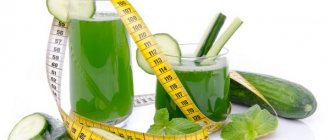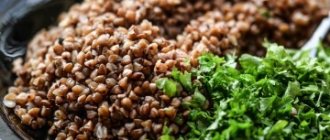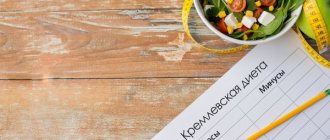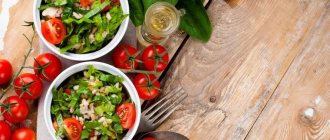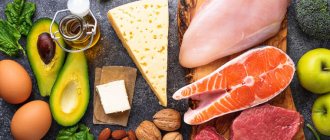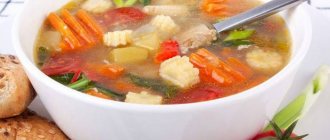Minus 24 kg without leaving home! A Muscovite who lost weight in quarantine “blew up” Russia with her recipe
The Mediterranean diet is a special style of nutrition where the national cuisines of many countries intersect. The basis of the diet with this way of life should be seasonal fruits and vegetables, as well as fish and seafood. The effectiveness of the Mediterranean diet in losing weight is supported by the fact that the inhabitants of this region are distinguished by excellent health and longevity, in addition, it is very rare to find obese people among them. How to ensure sustainable weight loss, and what products should be included in your diet for this, consistent with the principles of proper nutrition according to the Mediterranean diet - this article will tell you about this.
What is the essence of such a diet?
60% of the diet consists of: fruits, vegetables and complex carbohydrates, 30 percent is the share of vegetable fats (olive oil), 10 percent is proteins (seafood, fish, lean meat, cheese).
The process of losing weight occurs due to low consumption of unnatural and starchy foods, fatty foods, flour, sweets and carbonated drinks. It is especially pleasant to follow the Mediterranean diet on a seaside vacation. But for city residents, such a diet will not be a problem, because stores offer a good variety of natural products.
Mediterranean diet. You will find the menu for the week, recipes in our article Read the popular article on the site: Dates - benefits, nutritional value, calorie content.
To evaluate the results of a balanced diet for residents of Italy, Spain or France, no additional research will be required.
Statistics show that the Mediterranean diet has a positive effect on the body as a whole, is an effective prevention of various diseases, and most importantly, has a positive effect on a slim figure and muscle growth.
Interesting fact! Following the Mediterranean diet has no strict contraindications. An exception is an allergic reaction to a certain ingredient or medical prohibitions due to diseases of the gastrointestinal tract.
The principles of dieting include 3 key points:
- choose the correct (allowed) products to form a menu;
- eat food at a strictly defined time;
- exercise to activate metabolism and energy hunger.
The main advantage of this type of nutrition is a wide variety of dishes. Unlike strict mono-diets, the Mediterranean diet includes a lot of different foods, and the body does not experience “dietary” stress.
A combination of fresh vegetables and fruits, meat, legumes and dairy products contains all the necessary vitamins and minerals. It should not be overlooked that all of the above is easily adaptable to the Russian population, from the Caucasus to Siberia.
How to replace products in Russian conditions?
Perhaps the only drawback of the diet is the fairly high cost of its components. However, the Mediterranean menu can be easily adapted to the conditions of Russia.
Olive oil
The first product included in the diet of Mediterranean residents is, of course, olive oil. Therefore, the diet involves consuming it in sufficient quantities. It reduces the level of bad cholesterol in the blood and protects the heart.
In Mediterranean countries, it is used to dress salads or eat as a snack with bread. But you can’t fry on it. After all, during heat treatment it becomes “empty” and devoid of useful substances. You can fry only refined ones (according to experts, during heat treatment it forms fewer radicals than sunflower). But proper nutrition and fried food are incompatible concepts. Therefore, it is better to use a non-stick frying pan and cook in it without oil.
An alternative to olive oil would be unrefined vegetable oil. Olives can be replaced with sunflower and pumpkin seeds, walnuts.
Many people add olive oil for flavor. In this case, you can buy it in a spray and spray a small amount into the salad, and season the dish itself with vegetable oil.
Our usual vegetable oil contains more polyunsaturated fatty acids than olive oil. In sunflower - 72%, and in olive - only 10%. From this we can conclude that our native sunflower oil is no worse and even better than “overseas” olive oil. In addition, sunflower seeds are an excellent source of vitamin F, which is not synthesized in our body and prevents the development of atherosclerosis.
red fish
Red fish, which the Mediterranean diet recommends for consumption in large quantities, contain Omega-3 and Omega-6 polyunsaturated fatty acids. But few people know that these substances are found in flaxseed, olive oil, and less expensive types of fish - herring and mackerel.
To provide your body with a daily dose of omega acids, you need to eat 100 g of red fish (for example, trout). Eating 2 tbsp. l. flaxseed per day, you will get the same result. An excellent source of unsaturated fatty acids is cauliflower and nuts!
Since proper nutrition requires you not to eat fast food and other food waste, with the money you save you can afford to buy red fish 1-2 times a month.
You can replace “thoroughbred” varieties of fish with herring and mackerel. They are no less healthy, and they contain almost equal amounts of protein. Compare: salmon - 20 g; mackerel - 18 g; herring - from 17 to 19 g).
Let's calculate the cost:
- salmon - 450 rubles;
- herring - 200-250 rubles;
- mackerel - 100 rubles;
- flax seeds - 60 rub. (a 100-gram pack will last a long time);
- linseed oil - 150 rub. for 1 l;
- cauliflower - 95 rub.
Slowly digestible carbohydrates
Products containing slow carbohydrates occupy an important place in the lives of Mediterranean residents. But you don’t have to look for recipes for dishes made from expensive types of cereals (bulgur, couscous and elite Italian spaghetti). It is enough to find high-quality pasta made from durum wheat, buckwheat, wheat and pearl barley.
You can also eat legumes and our national product - potatoes (albeit baked with the peel and seasoned with aromatic oil). You can even eat oatmeal, but it’s best not to be lazy and find oatmeal. When it comes to rice, brown rice is best. But this does not mean that it should be the basis of your diet (then such nutrition will really be uneconomical).
But if you eat mainly the above-mentioned cereals and brown rice several times a month, then such nutrition will bring more benefits to your body and will not hit your wallet too hard.
Dairy
We have already said that residents of Mediterranean countries prefer whole fermented milk products. But the reason for this is not the harm of milk or cottage cheese, but solely the climate. You can safely eat cottage cheese (just not the low-calorie, calcium-free variety) and drink milk.
You are also allowed to eat hard cheese several times a week (but do not forget that it contains a considerable amount of salt and fat).
Mediterranean diet rules
- Eat vegetables every day. Fresh, boiled, stewed - very healthy. Keep potato consumption to a minimum. Eat more cabbage, tomatoes, peppers, eggplants, and olives. By the way, nutritionists say that olives speed up metabolism.
- Seafood and fish are very healthy, but the fish should be low-fat varieties. Choose a dietary cooking method: boiled or baked fish and seafood.
- Try to consume 1-2 jars of fermented milk product every day. It could be kefir or yogurt. They promote better intestinal function and speed up metabolism. In addition, fermented milk products contain calcium, which helps strengthen bones.
- Eat complex carbohydrates only at breakfast. This is buckwheat, rice, wholemeal bread, pasta. Complex carbohydrates help you gain energy in the morning and throughout the day, and those eaten in the morning do not have time to be stored as excess weight.
- Olive oil is a fat that will not make you fat! Dress salads with olive oil. Avoid mayonnaise and sour cream.
- Mediterranean people love cheese. Give preference to low-fat varieties.
- Meat is an important component of nutrition. Steam or boil the meat. Replace sweets with fruits. But be careful with bananas. They are very high in calories. Replace sugar with honey.
- Try to exclude potatoes, cottage cheese, pastries, sweets, alcohol, and carbonated drinks from your diet. You can only afford a little red or white wine.
Approximate weekly diet
| Day of the week | Breakfast | First snack | Dinner | Second snack | Dinner |
| Monday | Oats. porridge cooked in milk with the addition of any fruit. Fresh fruit smoothie | Kefir – 1 glass (can be replaced with natural yogurt) | Tomato salad, 1 fruit and tuna sandwich (canned) | Nuts – no more than 30 g | Vegetable salad, a slice of whole grain bread with cheese |
| Tuesday | Wheat porridge with pumpkin | Any fruit | Risotto with vegetables | Whole grain sandwich. bread, a slice of tomato and cheese | Salad with chicken and vegetables, a piece of cheese and bread (whole grain) |
| Wednesday | Cottage cheese casserole | Tea and oatmeal. cookies – 2 pcs. | Cheese – 2 pieces, a serving of vegetable stew with rice | Any fruit | Omelette (2 egg whites), 1 fruit |
| Thursday | Oat muffin with almonds | Dried fruits – up to 30 g | |||
| Friday | Omelette with herbs – 2 eggs | Fruit | Vegetable soup (cabbage and potatoes), grilled chicken | Glass of yogurt | Pilaf with seafood |
| Saturday | Oatmeal with nuts | Juice – 1 tbsp., piece of cheese | Fish soup, potatoes, baked. in the oven with cheese and vegetables | Fruit | Grilled eggplant, arugula salad |
| Sunday | Chicken eggs – 2 pcs., tomato and toast with cheese | Ovsyan. almond muffin | Cucumber and cabbage salad, steamed fish and a serving of vegetables. soup | A glass of juice | Mediterranean pasta salad |
This sample menu will help you understand how to eat the Mediterranean Diet. One of its main advantages is that the list of permitted products is quite extensive, so you can experiment in the kitchen as much as you like.
As an example, here is a recipe for one dish from the presented menu. To prepare a Mediterranean pasta salad, you need to prepare:
- Pasta (pasta from hard wheat varieties) – 200 g.
- Mozzarella – 200 g.
- Sweet pepper – 1 pc.
- Green peas (frozen) - half a glass.
- Parsley.
- Lemon.
- Olive oil (can be replaced with unrefined vegetable oil) – 2 tbsp.
This salad is easy to prepare. While the pasta is cooking, you can make a dressing by mixing lemon juice with oil and adding spices to taste. Next, you need to mix pepper, cheese and herbs. And the peas should be doused with boiling water in a colander when you drain the water from the finished pasta. Now add the mixture of cheese, herbs and peppers with peas and pasta, and pour the dressing over everything. This warm salad will decorate your diet table.
Health benefits of diet and what results can be achieved
The main questions: what are the benefits of Mediterranean cuisine, what results can you expect? A balanced menu is based on regular consumption of fresh herbs, seasonal vegetables and fruits, grains, and moderate amounts of meat. The beneficial microelements contained are more than enough to maintain the health and performance of all body systems.
According to medical research, the benefits of such a diet include the following:
- blood pressure and sugar levels are normalized;
- eliminating swelling and stabilizing kidney function;
- prevention of benign and malignant neoplasms;
- prevention of the development of vascular and heart diseases;
- strengthening the immune system;
- correct and stable functioning of the gastrointestinal tract.
The last point is one of the key ones. According to highly qualified nutritionists, normalizing the functioning of the digestive system is an important component in losing weight. It is with cleansing that any proper nutrition system begins. Many people who are losing weight exclude this stage, sincerely surprised that the chosen diet does not bring results.
Read the popular article in the category: Low-calorie foods for weight loss. List and Table.
By sticking to Mediterranean cuisine, weight loss is observed within a week and a half. Moreover, losing weight does not imply a sharp loss of kilograms; “proper weight loss” means slowly losing excess weight throughout the diet.
Main permitted products
The Mediterranean diet involves eating a variety of foods. There are a lot of them, but among the most basic are the following types.
- Seasonal vegetables and fruits - they contain many vitamins and minerals. You can safely eat them at least every day.
- It is better to prepare fermented milk products yourself. Or buy low-calorie foods. These include cheese, curdled milk, yogurt, kefir, fermented baked milk.
- Fresh greens. It is put into various dishes. It includes garlic, lettuce, green and onions, various herbs (basil, rosemary, etc.).
- Olive oil is, one might say, the basis of all dishes. Thanks to olive oil, we see the Mediterranean people as they are.
- Seafood, including lean fish. These dishes can be eaten every day. These include: trout, halibut, salmon, tuna, etc.
- It is recommended to consume little white meat. About 4 rubles. per week (no more than 100 grams).
- Red meat should be limited to 4 rubles. per month 100 gr.
- You can eat no more than one egg per day.
- Pasta should be purchased only from hard varieties (legumes, unprocessed rice, pearl barley, buckwheat).
- Red wine is used as an aperitif. But no more than 3 glasses for men and 2 glasses for women.
- Nuts, whole seeds and dried fruits no more than 1 r. during the week.
ATTENTION! You need to drink a lot of liquids. About 1.5 l. in a day.
Prohibited Products
It is difficult to strictly distinguish between “right” and “wrong” foods, because Mediterranean cuisine is very diverse, but there are a number of foods that should be completely avoided.
| Prohibitions and restrictions in the Mediterranean diet menu (a guide for preparing recipes for the week) | |
| Forbidden | Allowed with restrictions |
| Butter | Game: three times a week |
| Pork | Mutton, beef, lamb meat: once a week |
| Sugar, confectionery | Salt |
| Cheeses with a high percentage of fat | Sweet juices |
| Fast food, baked goods, white flour products | Grapes, bananas - in limited quantities |
| Sweet carbonated drinks | |
| Refined fats and sugars | |
| Whole milk | |
Diet Facts and Myths
Nutrition trends have changed a lot lately, which can make it difficult to know what's healthy and what's not. Therefore, it is important to be able to separate facts from myths.
Myth 1: The lower your fat intake, the better.
A few years ago, a low-fat diet was considered the best option for reducing the risk of heart disease. But today, most nutritionists recommend the Mediterranean diet as the most suitable for maintaining heart health, despite its fat content. Some fats are healthy and important for the body.
Myth 2: Diet food is tasteless
Many people mistakenly believe that food suitable for the proper functioning of the body does not contain salt, fat, spices, and therefore is absolutely tasteless. But the Mediterranean diet menu is rich in healthy vegetable fats, which are carriers of taste.
For example, a slice of avocado on whole grain bread, a handful of nuts in a steamed vegetable, or a few drops of olive oil in a tomato salad are sure to satisfy your taste buds while providing improved health.
Myth 3: Saturated fats are not bad for you.
Recently, the connection between saturated fat intake and health has been discussed in medical circles. Previously they were considered less harmful. But, according to scientists, this analysis is not accurate. On the contrary, there is evidence linking increased consumption of saturated fat to an increased risk of a number of diseases. It is beneficial to replace saturated fats with monounsaturated fatty acids (olive oil, seeds, fish oil, nuts) found in Mediterranean diet foods.
Sample Mediterranean diet menu for a week
When compiling your weekly diet, it should be varied as much as possible. By eating different foods, the body will receive the maximum amount of vitamins, the nervous system will be strengthened, and the rejection of prohibited ingredients will go unnoticed.
Interesting fact! The order of dishes can be changed, the main thing is to follow 3 rules: carbohydrates before lunch, proteins after lunch, main course at lunch. Vegetables are allowed at any time of the day, but their total volume should not exceed 1 kg.
| Breakfast | Dinner | Dinner | |
| Day #1 | two sandwiches with onions, pickles and sardines | seafood soup with vegetables | Greek salad with beans, celery, olives and chopped herbs |
| Day #2 | two ham sandwiches, low-fat yogurt or kefir. | rice, salmon in sour cream sauce with chopped herbs. | tomato soup with fried slices of bread and fresh herbs. |
| Day #3 | muesli with nuts and fruits (dried fruits). | grilled vegetables (red and green bell peppers, zucchini, eggplant). | boiled shrimp, toast or cheese sandwich. |
| Day #4 | sandwiches with mozzarella cheese and fresh tomato slices, banana or kiwi, fresh carrot juice. | pasta with lamb meat stewed with vegetables (bell pepper and zucchini). | vegetable salad with olive oil (radish, pickled gherkins, red and green bell peppers, olives, tomatoes, leeks). |
| Day #5 | fruits (papaya, melon, pineapple, banana, kiwi). | stewed vegetables with mozzarella, seasoned with nutmeg. | salad with shrimp and avocado. |
| Day #6 | ham sandwich, rice cake with low-fat butter. | light vegetable soup with chicken broth. | fish cutlets, boiled buckwheat, cherry tomatoes. |
| Day #7 | sandwiches with salami, slices of sweet bell pepper, and lettuce. | risotto with shrimp. | baked chicken meat with fresh vegetable salad and Feta cheese. |
A weekly or monthly Mediterranean diet menu does not imply strict prohibitions between meals. Snack recipes (lunch and afternoon snack) should consist of light dishes: fruits, vegetables, life-giving drinks.
Nutritionists recommend limiting them to fresh fruit, natural yogurt or low-fat kefir. Each meal should be at a certain time, this is the key to the proper functioning of the digestive system.
Priority drinks – filtered water, natural juices. Drink coffee, green or black tea without sugar, 3 to 4 cups per day are allowed. Dry wine is recommended for lunch or dinner, no more than 100 - 150 ml per day.
Read the popular article in the category: Impressive weight loss with Turboslim Alfa. Reviews and results of those who have lost weight.
Sweets are allowed once a week, these include dried fruits, honey, homemade cakes or desserts, for example, jelly, mousse, smoothies. It is better to opt for fresh fruit, but rarely eating homemade cookies is quite safe.
It is important to know! If the weekly menu looks too exotic, Mediterranean diet recipes can be adapted. It is allowed to replace the main dishes with porridge, wholemeal pasta, and vegetable stews.
How and what to eat
Three to four times a month you can eat:
- red meat;
- sweet.
The Mediterranean diet has become popular around the world due to its health benefits.
Four to five times a week:
- eggs;
- lean meat;
- fish;
- seafood;
- potatoes.
No limits:
- cheeses;
- yoghurts without added sweeteners, yogurt, kefir;
- nuts;
- legumes;
- cereals;
- dried fruits;
- seasonings, herbal ingredients;
- olive oil;
- vegetables;
- fruits;
- wholemeal bread;
- dry red wine;
- Group A pasta, spaghetti and pasta.
Residents of the Mediterranean live longer than in other countries and are less likely to suffer from cancer and heart diseases.
In what quantities can you consume the following foods for weight loss:
- cereals, pasta, bread, legumes - no restrictions;
- dairy and fermented milk products that provide calcium - 1-2 servings daily;
- nuts enriched with healthy fats that improve the condition of hair, skin, nail plates - a handful once a day;
- dried fruits containing pectin, which helps to gently cleanse the gastrointestinal tract - 1-2 servings daily;
- sea fish - 5-6 times a week;
- chicken, turkey, rabbit - 4 servings per week;
- potatoes - three times in 7 days;
- eggs - up to 4 pcs. in Week;
- chocolate products - up to 3 bars in 7 days;
- red meat - 100 g no more than four times a month;
- natural wine - no more than 300 ml per day as an aperitif;
- fruits - 3 servings daily;
- vegetables (fresh and after heat treatment) - 2 rubles. per day.
Olive oil plays an important role. It contains oleulethanolamide (allows you to quickly suppress hunger), saturated fatty acids (remove cholesterol), vitamin E, antioxidants and other elements necessary for the human body.
Residents of the Mediterranean coast consume vegetable oils and low-fat cheeses.
What not to eat
Excluded from the menu:
- fast food and semi-finished products;
- unrefined oil;
- sausages;
- cereals cleared of foreign impurities;
- products with hydrogenated fats;
- sliced loaf and bread;
- sweets, cookies, cakes, pastries, baked goods, preserves, jam, milk chocolate, ice cream;
- ketchup, mayonnaise, sauces (except vegetable, mustard and horseradish);
- salt and pepper in large doses;
- butter and margarine;
- alcohol (except high-quality dry red wine)
- baked goods made from white wheat flour;
- soft wheat pasta;
- smoked meat, lard, fatty meat, etc.;
- soda, boxed fruit juices;
- oily canned food;
- sweetened muesli, cereals and other breakfast cereals;
- fatty cheeses, high-calorie dairy and fermented milk products.
It is advisable to completely avoid the listed products.
Mediterranean residents are less likely to suffer from excess weight, high blood pressure, and Alzheimer's disease.
Recipes for the Mediterranean Diet
When preparing first or second courses, olive oil is always added; it is best to choose cold-pressed oil. Its quantity should be moderate.
The Mediterranean diet menu should be composed of natural cuisine products.
The diet includes all types of dishes: first course, second course, desserts. The most difficult thing to cook is soups and side dishes, especially if they are included as a regular dish in a weekly or monthly diet menu program.
Desserts, as a rule, are fruits (dried fruits), yogurt, dietary homemade baked goods, adapted to the daily diet.
Soup Ministrone
Main ingredients for soup:
- celery stalks (2 pcs);
- carrots (2 pcs);
- tomatoes (4 pcs);
- white cabbage (quarter of a head);
- potatoes (2 pcs);
- zucchini (2 pcs);
- eggplant (2 pcs);
- green peas (90 g);
- beef or vegetable broth (2 l);
- onion (1 medium head);
- olive oil;
- spices: cumin or basil, 2 cloves of garlic, chili pepper, salt.
All vegetables are fried in olive oil in a pan, spices are added. The broth is added several times in portions and the soup is cooked for 50 minutes.
Vegetable risotto
Main ingredients:
- zucchini (1 piece);
- eggplant (1 piece);
- large onion (1 pc);
- red pepper (1 pc);
- rice (300-350 g);
- vegetable broth or water (1.5 l);
- dried herbs, a couple of cloves of garlic, olive oil.
All vegetables are cut into small cubes, placed on a greased baking sheet and placed in the oven for 15-20 minutes. Onions and garlic are stewed separately in a frying pan with high walls, adding rice and then broth, and simmer for another 15-20 minutes (the water should evaporate and be absorbed). Place the baked vegetables in a frying pan with rice and stir.
Baked fish
Main ingredients:
- sea fish fillet;
- low fat cheese (70 g);
- kefir (50 g);
- vegetable or olive oil (50 g);
- lemon juice;
- dill greens.
Sea fish fillets are placed on a baking sheet greased with oil. Mix lemon juice, kefir, herbs and salt, put the resulting mixture on the fish meat. The top layer is grated cheese. The dish is prepared for 15-20 minutes in the oven at a temperature of 180°C.
Vegetable salad with avocado and shrimp
Main salad ingredients:
- tiger shrimps (300 g);
- avocado (1 piece);
- cherry tomatoes (6 pcs);
- lettuce leaves.
The dressing is traditional - olive oil; the salad is seasoned with basil, cilantro, lemon juice and pepper.
The shrimp are cleaned, lightly salted and fried in olive oil on all sides. Avocado is cut into slices, cubes or cubes, sprinkled with lemon juice. Place lettuce leaves on a plate and place chopped avocado on top. Next comes a layer of shrimp.
Cherry tomatoes are cut into four parts and placed on top. Fresh basil and cilantro should be coarsely chopped, pepper and salt to taste.
Interesting recipes
You can find a huge number of dishes for the Mediterranean diet on the Internet. Let's get acquainted with the most popular ones.
Oat muffins with almonds
To make 6 muffins you will need:
- 2 chicken eggs;
- 4 tbsp. l. milk powder;
- 4 tbsp. l. oat bran;
- a pinch of soda;
- 1 tsp. vanilla sugar;
- 7 almond kernels.
Preparation:
- Beat eggs in a bowl.
- Dry milk and bran are added to them.
- Mix everything well.
- The nut kernels are crushed and added to the dough.
- Pour the mixture into molds and place in a preheated oven.
Bake the muffins for 10-15 minutes.
Mediterranean pasta salad
To prepare the salad you will need the following products:
- 200 g of any paste;
- 150 g mozzarella cheese;
- red bell pepper;
- half a glass of green peas;
- olive oil;
- a little lemon juice;
- parsley.
Recipe:
- Cook the pasta according to instructions until done.
- Mix lemon juice and olive oil.
- Separately combine chopped cheese, chopped pepper and parsley.
- Pasta and peas are added to a mixture of cheese, pepper and parsley.
- Toss everything with dressing.
Serve the Mediterranean salad warm.
Chicken salad Summer
Required ingredients:
- 140 g boiled chicken breast;
- 2 fresh peaches;
- 50 g pineapples;
- ½ cup celery;
- lettuce leaves;
- half a glass of low-fat yogurt;
- mint;
- cinnamon;
- lemon zest.
Preparation progress:
- Breast, celery, peaches and pineapple are cut into cubes.
- Lettuce leaves are torn by hand.
- Mix chicken, celery and fruit.
- Prepare a dressing from yogurt, mint, cinnamon, lemon zest.
- Pour it over the food and mix.
Chicken salad is ready.
Chicken and spinach soup
A hearty and aromatic soup is prepared from the following products:
- boiled skinless chicken breast;
- carrot;
- 5 cups chicken broth;
- a handful of spinach;
- salt and pepper;
- whole grain crackers.
Preparation:
- Chopped carrots are thrown into the boiling broth.
- Cut the breast into cubes.
- Add it to the soup along with chopped spinach and croutons.
- Salt and pepper.
It is acceptable to use onions and marjoram in the recipe.
Iceberg lettuce
The salad is prepared from the following products:
- 3 lettuce leaves;
- half an avocado;
- 2 cherry tomatoes;
- yogurt for dressing;
- 30 g low-fat cheese.
Step by step recipe:
- Avocado is cut into cubes.
- Lettuce leaves are torn into pieces.
- Cherries are cut lengthwise.
- Mix the ingredients and season with yogurt.
Top the salad with grated cheese.
Eggplant baked with tomatoes, mushrooms and cheese
For the recipe you will need:
- 2 eggplants;
- 5 tomatoes;
- two cloves of garlic;
- 50 g soft cheese;
- 150 g mushrooms;
- breadcrumbs;
- some hard cheese:
- 50 mg olive oil.
Preparation:
- Eggplants and tomatoes are cut into circles.
- Mushrooms are chopped in half.
- Finely chop the cheese and garlic.
- Sprinkle a greased baking sheet with breadcrumbs.
- Lay all the products on the surface in layers - eggplants, tomatoes, garlic, soft cheese, remaining eggplants, tomatoes and mushrooms.
- Place the pan in the oven for 40-50 minutes.
10 minutes before the end of cooking, sprinkle with hard cheese.
Rules for quitting the diet
Despite the fact that this nutrition program is not a diet that must be strictly followed, the transition to a normal diet must be properly organized. It is not recommended to suddenly return to consuming large amounts of sugar, fatty meats, potatoes and alcohol.
When leaving the diet, you should gradually introduce familiar dishes into your daily diet, cook red meat more often, and add potatoes to vegetable dishes. You can add butter little by little to the porridge; in the first days, limit it to the minimum amount. They also increase the volume of fruits and vegetables, consuming bananas and grapes more often.
Completing the diet will take 4 weeks, during which time the body will gradually rebuild. If you switch to fatty foods prematurely, you may experience indigestion or heartburn.
Before you start changing your nutrition system, it is useful to spend 2-3 fasting days. To do this, it is not at all necessary to starve; usual dishes are replaced with stewed or fresh vegetables, drink kefir, carrot juice. Then you can begin to change your diet; after several fasting days, the transition will be unnoticeable.
Recommendations
For the principles of the Mediterranean diet to work, you need to know the basic rules for following it.
About products and meals
- Cereals are eaten for breakfast.
- Vegetables, pasta, noodles, rice, a glass of wine - for lunch.
- Proteins and vegetables for dinner.
- Fruits for dessert (3 servings per day).
- Minimize consumption of figs, grapes, bananas and fruit juices.
- For dairy products, give preference to milk and yogurt (low-fat).
- Cheese is introduced into the diet in moderation.
- Fish is grilled, boiled or stewed twice a week.
- Meat should be lean and without preservatives.
- Honey and sweets are allowed once a week.
Many people ask whether rolls can be included in the Mediterranean diet: yes, this is not forbidden. However, you can eat them no more than 2 times a week.
About the weight loss method
- Lead an active lifestyle and exercise, as the diet involves consuming enough carbohydrates.
- Establish a clear daily routine: meals should be at the same time.
- Drink more water.
- Look for recipes adapted to Russia.
- Always remember that this is a fairly unusual diet. There are no specific dates that promise the loss of so many kilograms. This is a nutrition system that produces results over time.
Since the Mediterranean diet has long been adapted to Russian conditions, there is usually no problem finding the right recipes so as not to go crazy and enjoy a varied menu.
Turkish cuisine. Minimal use of spices. They love to cook vegetables and meat on the grill. Here you can find many eggplant dishes and unique recipes for sweets and baked goods.
The main mistakes of losing weight and how to avoid them
Key diet mistakes are not fully understanding which foods are allowed and which should not be included in weekly recipes. The diet allows you to include bread and pasta in the menu, but they should not be made from white flour.
Regular consumption of olive oil can be a big problem when losing weight on the Mediterranean diet, because it contains a large number of “useless” calories.
According to nutritionists, “a small portion of olive oil will not harm a healthy and active person.” A sedentary lifestyle or abuse of vegetable fat can minimize the result.
Breakdowns are one of the biggest mistakes of any diet . Since Mediterranean cuisine is varied, a daylong breakdown and one-time overeating will not block all the efforts made. It is enough to spend 1-2 fasting days and return to the correct nutrition program.
To avoid breakdowns, you should clearly plan your menu; a properly balanced diet will ensure that the body is fully saturated with useful microelements.
Reviews and results of losing weight
- Anna, 23 years old: “Before the Mediterranean diet, I followed the ballerina diet and low-calorie diet. To be honest, I was starving. There were failures, the result was zero. And this system suited me very well: the kitchen is interesting, pleasant, the weight came off smoothly and easily. As a result, minus 10 kg in 8 weeks!”
- Marina, 30 years old: “A promising diet, but it didn’t help me. It seemed to me that the option was not budgetary and not universal. Good for summer, but I gain weight mainly in winter.”
- Ksenia, 35 years old: “This diet is a real find for me! Previously, I tried to select lower-calorie alternatives for all products, but here I can eat everything I love, even porridge and pasta. And I was satisfied with the result: in a month - 4 kg off.”
- Vera, 40 years old: “An excellent method of healthy weight loss without hysterical throwing! What pleased me most was the variety and the almost complete absence of prohibitions. I lost 5 kg in a month with the help of a diet.”
It is no coincidence that by decision of UNESCO in 2010, the diet was given the status of an object of intangible cultural heritage.
The Mediterranean diet is one of the best nutrition programs that meets the standards of a healthy diet . If you follow her rules, not only your weight will change. Those who appreciate the results of the program make it a way of life, a kind of worldview.
Opinions of doctors and nutritionists about the Mediterranean diet
Experts believe that the Mediterranean diet can be considered the standard diet for a healthy person.
A properly composed menu for a week, a month or a longer period of time, with recipes for healthy dishes, and regular exercise guarantee the normal functioning of the digestive organs, maximum absorption of nutrients due to increased metabolism, and excellent human condition without bad habits.
The program prevents the development of various diseases and heals the body as a whole. Reducing cholesterol levels, normalizing pressure and functioning of the gastrointestinal tract contribute to the complete digestion of food; feeling great allows you to exercise more often or introduce it into your lifestyle.
This nutritional system has no age restrictions and is allowed during pregnancy or lactation.
An important aspect is physical activity, which is mandatory when following the Mediterranean diet. An active lifestyle keeps the entire body in good shape, promotes the proper functioning of the digestive system, and has a positive effect on the cardiovascular system.
It is not necessary to engage in sports professionally; the standard minimum is daily exercise in the morning and evening. And the Mediterranean diet is simple, pleasant, and at the same time, very effective!
Mediterranean diet. Menu for the week, recipes in this useful video:
https://www.youtube.com/watch?v=Ng7do0Qffi4
Mediterranean diet menu for the week:
Benefits and harms
Recent studies have shown that the Mediterranean diet reduces the risk of cancer, cardiovascular disease, diabetes, high blood pressure and obesity. All this is thanks to the abundant consumption of fresh vegetables, fruits, grains and minimal consumption of meat and fish.
Scientists have tried to isolate individual components that provide such a powerful medical effect. But systematic research led to the conclusion that this is impossible, since this is not a decomposed, balanced and very harmonious system.
Advantages:
- Many products can be bought in the store or replaced with equivalent ones (tuna - pink salmon or salmon, avocado - pear, papaya - peach).
- Balanced diet.
- Preserves health and beauty, prolongs youth.
- Develops the habit of eating right, which subsequently maintains normal weight.
- There are many permitted products, which allows you to prepare delicious dishes, different for every day.
- Adapted to the traditions of Russian cuisine: there are practically no products that are not familiar to our body.
- Minimal risk of failure.
- Does not make you suffer from hunger.
- Possibility to combine with physical activity.
Flaws:
- You cannot lose weight quickly (there are completely different diets for this).
- Will not save you from obesity.
- Difficult to tolerate for those with a sweet tooth.
- The dishes contain a lot of fiber, which can cause stomach problems.
- Contraindications: any problems with the gastrointestinal tract.
- Some products are too specific, difficult to find, and quite expensive.
Italian Cuisine. Traditional dishes: pizza, lasagna, spaghetti, pasta.
Basic principles of nutrition
First of all, you should understand that sudden “breakdowns” are strictly not recommended within the framework of the Mediterranean diet. There are no cardinal restrictions in this system, and its main principle is healthy eating. In addition, a number of other principles can be identified, namely:
- consumption of large quantities and on a regular basis of vegetables and fruits;
- cooking food in a steamer, oven and grill;
- It is necessary to consume fresh and, if possible, raw foods;
- before cooking the cereal, it should be soaked in water for 24 hours;
- per day you need to drink at least 1.5 liters of purified and still water.
Fats should be replaced with olive oil. Breakfast every day should include carbohydrates, and for dinner you should eat proteins, and also give preference to fresh or stewed vegetables. Bread products are best consumed at lunch or for breakfast in strictly limited quantities. Otherwise, you may gain unwanted weight. The same can be said about sweets.
It should be understood that you will have to eat often, but in small quantities. But it is recommended to completely exclude salt from the diet. It is better to give preference to herbs or other spices. Tea and coffee can be consumed in unlimited quantities, but without added sugar. It is also permissible to drink alcohol, but in small quantities. It is recommended to choose red and dry wine. And as a substitute for sugar, you can use honey or natural analogues.
What and how to eat?
The Mediterranean diet allows you to eat foods such as:
- red fish and other seafood - no more than 4 times in 7 days;
- lean meat 2 to 5 times a week;
- lean red meat - 5 to 6 times a month;
- eggs - 2-4 per 7 days;
- fruits 3 times a day;
- vegetables, both fresh and baked, 2 servings daily;
- dairy products every day;
- wine 2 times a day.
What dishes and products are prohibited?
The presented diet has a number of restrictions, and recipes for prepared dishes cannot include such products as:
- fast food and other semi-finished products;
- refined and vegetable oil;
- sausages;
- refined cereals;
- products containing hydrogenated fats.
Analogues of products in the Russian Federation
In Russian conditions, not every person can afford to purchase the products recommended for this diet due to their high cost. But there is a way out of this situation, and the menu can be easily adapted to our country.
Olive oil.
The population of Mediterranean countries is very fond of olive oil, and there is quite a lot of it in the presented diet. It is usually used as a salad dressing, or consumed in its pure form with bread. But you can’t use it for frying, because... at the time of heat treatment it will lose all useful substances. For these purposes, it is necessary to use refined oil, but... It should be understood that fried foods and proper nutrition are completely different concepts. Therefore, it is best to purchase a non-stick frying pan and cook without using oil.
And an excellent replacement for olive oil would be unrefined vegetable oil. Instead of olives, you can use sunflower, pumpkin seeds or walnuts.
Many people like the smell of olive oil in salads. If you belong to the category of such people, then it is best to purchase oils of the “spray” type and add a little to the salads you prepare, after seasoning them with vegetable oil.
red fish
These types of fish contain Omega-3 and Omega-6 polyunsaturated fatty acids. But almost no one understands that the same substances are also found in flax seeds and other types of fish (for example, herring or mackerel).
In order to provide the body with the necessary amount of Omega fatty acids, a person should eat 100 grams of red fish. But eating 2 tablespoons of flax seeds will give you a similar dose. In addition, unsaturated fatty acids are found in nuts and cauliflower.
Due to the fact that the presented diet prohibits even the rare consumption of fast food and other “garbage”, we can afford to buy red fish several times a month with the saved money. And if this is not possible, then give preference to herring and mackerel. They contain almost identical amounts of protein. For example, salmon contains 20 g, mackerel contains 18 g, and herring contains from 17 to 19 g.
Average prices:
- salmon - 450 rubles;
- herring - 200-250 rubles;
- mackerel - 100 rubles;
- flax seeds - 60 rub. (a 100-gram pack will last a long time);
- linseed oil - 150 rub. for 1 l.;
- cauliflower - 95 rub.
Slow digestion carbohydrates
Products containing slow carbohydrates are widely popular in the cuisine of Mediterranean countries. But you don’t have to look for recipes using expensive cereals or luxury spaghetti. They can be replaced with regular pasta, buckwheat, pearl barley or wheat. In addition, legumes and potatoes are allowed. But the latter must be baked with the peel on. You can even eat oatmeal, or even better, use oatmeal. You can also eat brown rice.
Dairy
We said above that Mediterranean women and men prefer fermented milk products. But this is not because milk and cottage cheese are harmful to the body. It all lies in the climatic characteristics of these territories. Therefore, you can eat cottage cheese and drink milk, but these products should contain a small amount of calories. You can also eat a few pieces of hard cheese 2-4 times a week.
Mediterranean diet: Menu for the week
The presented menu for the week consists exclusively of delicious dishes, the preparation of which will not take much time. This menu can be extended for a month. You should know that you should eat at least 5 times a day. During second breakfast and afternoon snack, you can eat fruits, fresh vegetables and nuts (we decided not to mention these items in the description below).
The first day
Breakfast: – oatmeal with the addition of fruits or berries, as well as honey
Lunch: – soup with fish or vegetable broth, light salad with vegetable oil or low-fat sour cream. You can also use kefir as a dressing.
Dinner: – fish baked in the oven (or boiled) and some stewed beans.
Second day
Breakfast: – wheat or millet porridge with baked pumpkin or apples.
Lunch: – chicken, vegetable salad with pumpkin seeds or chicken puree soup.
Dinner: – stewed chicken breast with vegetables or fish. You can also eat cottage cheese with kefir instead of meat.
Day three
Breakfast: – baked potatoes with vegetables;
Lunch: – buckwheat soup with tomatoes and meatballs.
Dinner: – Baked chicken cutlets with pumpkin pulp and a light vegetable salad dressed with sour cream.
Day four
Breakfast: – durum wheat pasta with cheese sauce.
Lunch: – cauliflower casserole, beef soup with rice.
Dinner: – vegetable lasagna with chicken and a glass of kefir.
Day five
Breakfast: – stewed rice with vegetables.
Lunch: – vegetable soup, salad with boiled fish and vegetables, or broccoli casserole.
Dinner: – Cottage cheese casserole with apples or pumpkin, kefir.
Day six
Breakfast: – oatmeal with dried fruits and honey, kefir with flax seeds and berries.
Lunch: – fish broth, stewed vegetables.
Dinner: – Fish with vegetables and flatbread made from oatmeal or buckwheat flour.
Day seven
Breakfast: – a chicken egg, a piece of whole grain bread and a couple of slices of hard cheese. Instead of butter for a sandwich, you can use cottage cheese with added herbs.
Lunch: – pasta and rabbit stewed in sour cream with vegetables.
Dinner: – an omelette with vegetables or a boiled egg and a light salad.
As you can see, the Mediterranean diet is extremely easy to follow. It is suitable not only for young people and representatives of the middle age category, but will be an excellent option for older people after 60. Therefore, take it into service and start eating right and leading a healthy lifestyle now.
Let's summarize
The Mediterranean diet is the ideal solution if you are concerned about your health and want to choose a gentle but effective nutritional system. The wide variety of foods that are allowed makes it possible to cook many different dishes, experimenting with recipes. It’s not for nothing that many Hollywood stars adhere to this particular nutritional system. She receives positive feedback on the results from Penelope Cruz, Britney Spears, Monica Bellucci. Try to lose weight without pushing yourself into strict limits.
How many pounds have you lost thanks to the Mediterranean diet?


